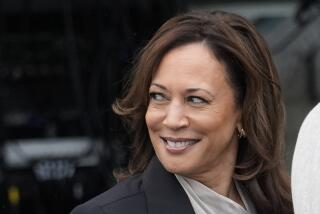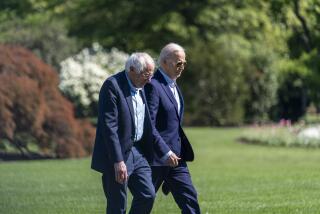Analysis:: Bernie Sanders lists his demands and declines to praise Hillary Clinton — but how much leverage does he have left?
Bernie Sanders’ presidential campaign ended with what had become his standard pitch in recent months as his odds of defeating Hillary Clinton dimmed: a long list of demands for the Democratic Party, a host of thinly veiled insults against party leaders and no recognition for the woman who outdistanced him in the popular vote and delegates en route to clinching the presidential nomination.
Sanders never mentioned Clinton’s historic accomplishment except by inference when he said that his campaign henceforth would be about “defeating Donald Trump.” He never actually said that Clinton had defeated him, or even that he was bowing out of the race, despite the fact that there are no more primaries to contest.
The absence of typical political grace by the defeated candidate was reminiscent of another insurgent inveighing against the establishment: Democrat Jerry Brown never got around to endorsing Bill Clinton in 1992 after the future president became his party’s nominee.
See more of our top stories on Facebook »
But if Sanders’ pitch Thursday night was consistent with his entire pursuit, it also came after his power seemed to have ebbed.
In the last 10 days, Clinton has won the endorsement of President Obama and Vice President Joe Biden, as well as Massachusetts Sen. Elizabeth Warren, a competitor with Sanders for the affections of the liberal left. Clinton won all of the big contests in June--and decisively, despite Sanders’ confidence that he would do well and public claims that he would win convincingly.
Those developments have solidified the Democratic Party into something approaching unity.
Also weakening Sanders’ position have been Donald Trump’s recent stumbles. Even with only a portion of Sanders’ voters lining up behind her, Clinton has taken a strong lead over Trump in polls taken over the last couple of weeks. That has lessened – for now – the urgency with which Clinton needed Sanders to deliver his mostly young adherents and thus has reduced the leverage he once had.
Democrats, however, remain uncertain about what might come next in this unprecedented political campaign. So full unity — with Sanders acknowledging Clinton’s win, however grudgingly — remains a deep desire of party activists.
Election 2016 | Live coverage on Trail Guide | Track the delegate race | Sign up for the newsletter
Rather than be a participant in that, however, Sanders on Thursday appeared to be an isolated survivor of the campaign whirlwind, delivering his swan song via video before a plain blue backdrop bearing his name, a performance that lacked the energy and enthusiasm that had marked his campaign while it lived.
Sanders clearly was intent on maintaining some ambiguity about his plans. The only way in which his Thursday night remarks deviated from his standard stump speech occurred when he recounted his Tuesday meeting with Clinton. But that mention was leavened with some barely veiled insults.
It is no secret that Secretary Clinton and I have strong disagreements on some very, very important issues.
— Bernie Sanders
“It is no secret that Secretary Clinton and I have strong disagreements on some very, very important issues,” he said, before adding that their views on others were close.
“I look forward, in the coming weeks, to continued discussions between the two campaigns to make certain that your voices are heard and that the Democratic Party passes the most progressive platform in its history--and that Democrats actually fight for that agenda.”
The wording echoed comments that Sanders has made before--in particular after his supporters took part in a near-brawl at a party convention last month in Nevada. In a response days later, he laid much of the blame for his supporters’ actions on Democratic leaders who he said had not adequately embraced his backers.
He claimed then, as he implied Thursday, that only his side was willing to fight for what have been Democratic goals of long standing, in some cases for decades.
Those earlier remarks enraged Democrats—and Thursday’s were likely to rankle, as well—because many have been fighting to change the party from within even as Sanders, a longtime independent, remained outside of it. As they tell it, Sanders has basically suggested that a party that includes civil rights legends like John Lewis and longtime economic and environmental battlers like Barbara Boxer has been far less interested than he is in racial, economic and environmental justice.
Sanders also none-too-subtly criticized Clinton, who as he spoke Thursday had a 919-delegate lead over him--more than 400 over the majority required to win the nomination. He said he looked forward to working with her to “transform the Democratic Party so that it becomes a party of working people and young people and not just wealthy campaign contributors,” the latter being an alliance for which he has criticized Clinton in every speech.
The party should be one, he said, “that has the guts to take on Wall Street, the pharmaceutical industry, the fossil fuel industry and other powerful special interests that dominate so much of our political and economic life.” All of those interests were ones that, in every speech, Sanders has accused Clinton of promoting.
The Thursday night remarks offered Sanders a public opportunity to clarify his priorities for the party’s platform, which he plans to try to influence at the July Democratic convention in Philadelphia. There was little in the way of prioritizing, however, as Sanders listed every issue he emphasized in his campaign.
The issues include some, such as pay equity for women and abortion rights, which Clinton has championed for at least as long as he has. Others, including equal rights for same-sex marriage, comprehensive immigration reform and expansion of benefits for Social Security recipients, now have broad acceptance in the party.
A third group of issues, such as breaking up the big banks, a ban on fracking, making public colleges and universities free and imposing a universal Medicare-style healthcare plan, remain points of contention on which the Clinton camp probably will offer some concessions, but not full agreement. Sanders gave no indication of what steps toward compromise he might offer.
In making his list a set of demands, Sanders put himself in the awkward position of a distant second-place finisher insisting on fealty from the winner.
Sanders blamed the current leadership of the Democratic Party for a host of failures, persisting in his long battle against party chair Debbie Wasserman Schultz. (There was some irony to his claim that Democrats needed a 50-state strategy, since earlier this year Sanders repeatedly dismissed Clinton’s romping victories in Southern states because they occurred in “the most conservative part” of the country that would vote Republican in November.)
He did, however, encourage his followers to become engaged in the process in order to increase Democratic success in local and state races, which Republicans increasingly have won during the Obama years. It’s not solely for the reasons Sanders suggested—the failure of Democratic leaders to compete—but marshaling his troops in that endeavor might help smooth over the views of Democrats smarting over Sanders’ strategies.
Without saying that his candidacy was ending, Sanders closed his remarks by saying that his campaign was beginning “the long and arduous process of transforming America.” He hoped, he said, that “when future historians look back and describe how our country moved forward … they will note that to a significant degree that effort began with the political revolution of 2016.”
As to whether those historians would also note the first presidential nomination of a woman by a major political party or, with Sanders’ help, her election in the fall, Sanders was silent.
ALSO
California’s presidential party is over, and here are some lessons
Sanders’ voters in California looking for concessions from Clinton, but most plan to support her
Hillary Clinton up, Donald Trump down after a week that flipped the presidential campaign
Updates on California politics
Live coverage from the campaign trail
Twitter: @cathleendecker
More to Read
Get the L.A. Times Politics newsletter
Deeply reported insights into legislation, politics and policy from Sacramento, Washington and beyond. In your inbox three times per week.
You may occasionally receive promotional content from the Los Angeles Times.











